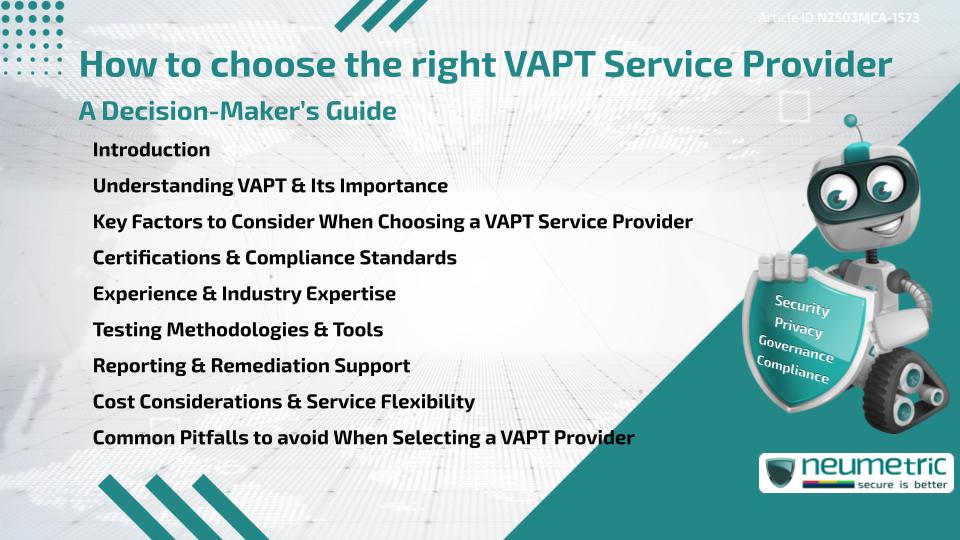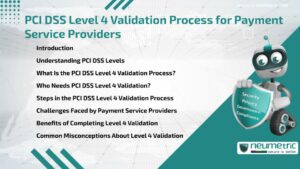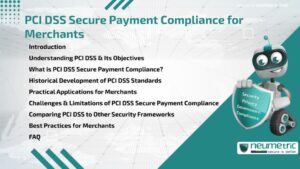Table of Contents
ToggleIntroduction
Vulnerability Assessment & Penetration Testing [VAPT] is crucial for identifying & mitigating security threats in IT environments. With increasing Cyber Threats, selecting the right VAPT service provider is essential for safeguarding Sensitive Data & maintaining Compliance with security standards. This guide explains How to choose the right VAPT service provider by evaluating key factors like experience, Certifications, methodologies & cost.
Understanding VAPT & Its Importance
VAPT consists of two essential security practices:
- Vulnerability Assessment (VA): Identifies security weaknesses in a system.
- Penetration Testing (PT): Simulates attacks to exploit Vulnerabilities & assess Risk impact.
Organisations need VAPT to ensure Compliance, protect Sensitive Data & strengthen Cybersecurity defenses.
Key Factors to Consider When Choosing a VAPT Service Provider
Certifications & Compliance Standards
A reputable VAPT provider should hold industry-recognized Certifications such as:
- Certified Ethical Hacker [CEH]
- Offensive Security Certified Professional [OSCP]
- ISO 27001 Compliance
- SOC 2 Compliance
Certifications indicate that the provider follows Best Practices & complies with Industry Regulations.
Experience & Industry Expertise
Different industries have unique security needs. A provider with experience in your sector (e.g., Finance, Healthcare or retail) will better understand regulatory requirements & common attack vectors.
Testing Methodologies & Tools
A good provider should use industry-standard testing methodologies such as:
- Open Web Application Security Project [OWASP] guidelines
- National Institute of Standards & Technology [NIST] Framework
- Automated & manual testing approaches
Reporting & Remediation Support
Comprehensive reports should include:
- Detailed Vulnerability descriptions
- Risk severity levels
- Recommendations for remediation
Providers should also offer post-testing support to help address security weaknesses.
Cost Considerations & Service Flexibility
While cost is a factor, choosing the cheapest option can compromise security quality. Look for providers offering scalable & flexible solutions tailored to your business needs.
Common Pitfalls to avoid When Selecting a VAPT Provider
- Focusing only on cost: Low-cost providers may lack expertise or use outdated methodologies.
- Ignoring post-assessment support: Ensure the provider offers remediation guidance after testing.
- Overlooking Compliance needs: Select a provider familiar with industry-specific security regulations.
Conclusion
Choosing the right VAPT service provider is crucial for protecting your Organisation’s digital assets & ensuring Compliance with security standards. By evaluating providers based on Certifications, industry expertise, testing methodologies & support services, businesses can make informed decisions that enhance their security posture. Avoiding common pitfalls & prioritizing quality over cost will help you select a reliable VAPT partner that meets your Cybersecurity needs.
Takeaways
- Choose a provider with recognized Certifications & Compliance expertise.
- prioritise industry experience & proven testing methodologies.
- Ensure comprehensive reporting & remediation support.
- Consider cost but avoid compromising on quality & expertise.
- Avoid common pitfalls such as ignoring Compliance & post-testing support.
FAQ
What is the role of a VAPT service provider?
A VAPT service provider identifies security Vulnerabilities in IT systems & helps Organisations mitigate potential Cyber Threats.
How do Certifications impact the selection of a VAPT provider?
Certifications like CEH & OSCP indicate that the provider follows industry Best Practices & maintains high-security standards.
Why is industry experience important when choosing a VAPT provider?
Industry-specific experience ensures that the provider understands relevant security Risks & Compliance Requirements.
What is the difference between automated & manual testing in VAPT?
Automated testing quickly scans for known Vulnerabilities, while manual testing identifies complex security issues that automated tools may miss.
How often should an Organisation conduct VAPT assessments?
Organisations should conduct VAPT assessments at least annually or whenever significant changes are made to their IT infrastructure.
What factors should be considered in a VAPT report?
A VAPT report should include Vulnerability descriptions, Risk levels & detailed remediation recommendations.
Is post-assessment support necessary after VAPT?
Yes, post-assessment support is crucial for effectively addressing identified Vulnerabilities & improving security posture.
How can businesses ensure cost-effective VAPT Services?
Businesses should compare providers based on Certifications, methodologies & service quality rather than cost alone.
Can a single VAPT assessment guarantee complete security?
No, Cybersecurity Threats evolve constantly. Regular VAPT assessments are necessary to maintain security resilience.
Need help?
Neumetric provides organisations the necessary help to achieve their Cybersecurity, Compliance, Governance, Privacy, Certifications & Pentesting goals.
Organisations & Businesses, specifically those which provide SaaS & AI Solutions, usually need a Cybersecurity Partner for meeting & maintaining the ongoing Security & Privacy needs & requirements of their Clients & Customers.
SOC 2, ISO 27001, ISO 42001, NIST, HIPAA, HECVAT, EU GDPR are some of the Frameworks that are served by Fusion – a centralised, automated, AI-enabled SaaS Solution created & managed by Neumetric.
Reach out to us!





